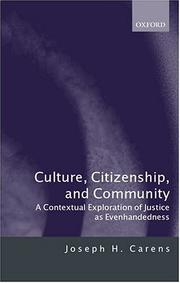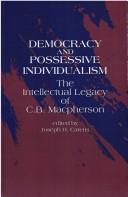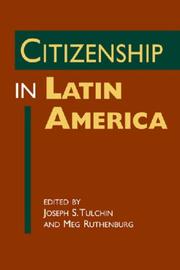| Listing 1 - 10 of 10 |
Sort by
|
Book
ISBN: 9780199933839 0199933839 Year: 2013 Publisher: Oxford: Oxford university press,
Abstract | Keywords | Export | Availability | Bookmark
 Loading...
Loading...Choose an application
- Reference Manager
- EndNote
- RefWorks (Direct export to RefWorks)
In The Ethics of Immigration, Joseph Carens synthesizes a lifetime of work to explore and illuminate one of the most pressing issues of our time. Immigration poses practical problems for western democracies and also challenges the ways in which people in democracies think about citizenship and belonging, about rights and responsibilities, and about freedom and equality. Carens begins by focusing on current immigration controversies in North America and Europe about access to citizenship, the integration of immigrants, temporary workers, irregular migrants and the admission of family members and refugees. Working within the moral framework provided by liberal democratic values, he argues that some of the practices of democratic states in these areas are morally defensible, while others need to be reformed. In the last part of the book he moves beyond the currently feasible to ask questions about immigration from a more fundamental perspective. He argues that democratic values of freedom and equality ultimately entail a commitment to open borders. Only in a world of open borders, he contends, will we live up to our most basic principles. Many will not agree with some of Carens' claims, especially his controversial conclusion, but none will be able to dismiss his views lightly. Powerfully argued by one of the world's leading political philosophers on the issue, The Ethics of Immigration is a landmark work on one of the most important global social trends of our era.
Migration. Refugees --- Sociology of minorities --- Ethics --- General ethics --- Illegal aliens --- Emigration and immigration --- Government policy --- Moral and ethical aspects. --- United States --- Government policy.
Book
ISBN: 0226092690 9780226092690 Year: 1981 Publisher: Chicago: University of Chicago press,
Abstract | Keywords | Export | Availability | Bookmark
 Loading...
Loading...Choose an application
- Reference Manager
- EndNote
- RefWorks (Direct export to RefWorks)
Economic order --- Income distribution. --- Incentives in industry. --- Capitalism. --- Utopias.

ISBN: 0198297513 0198297688 0191522937 9786611989729 128198972X 9780198297680 Year: 2000 Publisher: Oxford: Oxford university press,
Abstract | Keywords | Export | Availability | Bookmark
 Loading...
Loading...Choose an application
- Reference Manager
- EndNote
- RefWorks (Direct export to RefWorks)
This text seeks to contribute to debates about multiculturalism and democratic theory. It reflects upon the ways in which claims about culture and identity are advanced by immigrants, national minorities, aboriginals and groups in different societies.
Justice. --- Multiculturalism. --- Cultural pluralism --- Democracy. --- Justice --- Multiculturalisme --- Diversité culturelle --- Démocratie --- Multiculturalism --- Democracy --- Cultural pluralism. --- Diversité culturelle --- Démocratie --- Cultural diversity policy --- Cultural pluralism policy --- Ethnic diversity policy --- Injustice --- Cultural diversity --- Diversity, Cultural --- Diversity, Religious --- Ethnic diversity --- Pluralism (Social sciences) --- Pluralism, Cultural --- Religious diversity --- Self-government --- Government policy --- Social policy --- Anti-racism --- Ethnicity --- Cultural fusion --- Conduct of life --- Law --- Common good --- Fairness --- Culture --- Political science --- Equality --- Representative government and representation --- Republics
Book
ISBN: 9780262014830 Year: 2010 Publisher: Cambridge, Mass. London MIT Press
Abstract | Keywords | Export | Availability | Bookmark
 Loading...
Loading...Choose an application
- Reference Manager
- EndNote
- RefWorks (Direct export to RefWorks)
Amnesty --- Government policy --- United States --- Illegalen --- Emigration and immigration --- Illegal aliens --- #SBIB:35H6030 --- #SBIB:39A6 --- Criminal justice, Administration of --- Executive power --- Clemency --- Forgiveness --- Pardon --- Political rehabilitation --- Bestuur en beleid: nationale en regionale studies: Verenigde Staten --- Etniciteit / Migratiebeleid en -problemen --- Law and legislation --- Government policy.

ISBN: 0585087288 9780585087283 0791414574 0791414582 0791498484 Year: 1993 Publisher: Albany : State University of New York Press,
Abstract | Keywords | Export | Availability | Bookmark
 Loading...
Loading...Choose an application
- Reference Manager
- EndNote
- RefWorks (Direct export to RefWorks)
Democracy. --- Individualism. --- Liberalism. --- Liberal egalitarianism --- Liberty --- Political science --- Social sciences --- Economics --- Equality --- Self-interest --- Sociology --- Libertarianism --- Personalism --- Persons --- Self-government --- Representative government and representation --- Republics --- Macpherson, C. B. --- Macpherson, Crawford Brough --- Macpherson, Crawford Brough,

ISBN: 0773513418 0773513426 Year: 1995 Publisher: Montreal : McGill-Queen's University Press,
Abstract | Keywords | Export | Availability | Bookmark
 Loading...
Loading...Choose an application
- Reference Manager
- EndNote
- RefWorks (Direct export to RefWorks)
Federal government --- Nationalism --- Fédéralisme --- Nationalisme --- Québec (Province) --- History --- Autonomy and independence movements --- Histoire --- Autonomie et mouvements indépendantistes
Multi

ISBN: 1526105233 1526105225 152610525X 1526105241 Year: 2018 Publisher: Manchester, UK : Manchester University Press,
Abstract | Keywords | Export | Availability | Bookmark
 Loading...
Loading...Choose an application
- Reference Manager
- EndNote
- RefWorks (Direct export to RefWorks)
This book addresses the major theoretical and practical issues of the forms of citizenship and access to citizenship in different types of polity, and the specification and justification of rights of non-citizen immigrants as well as non-resident citizens. It also addresses the conditions under which norms governing citizenship can legitimately vary. The book discusses the principles of including all affected interests (AAI), all subject to coercion (ASC) and all citizenship stakeholders (ACS). They complement each other because they serve distinct purposes of democratic inclusion. The book proposes that democratic inclusion principles specify a relation between an individual or group that has an inclusion claim and a political community that aims to achieve democratic legitimacy for its political decisions and institutions. It contextualizes the principle of stakeholder inclusion, which provides the best answer to the question of democratic boundaries of membership, by applying it to polities of different types. The book distinguishes state, local and regional polities and argues that they differ in their membership character. It examines how a principle of stakeholder inclusion applies to polities of different types. The book illustrates the difference between consensual and automatic modes of inclusion by considering the contrast between birthright acquisition of citizenship, which is generally automatic, and naturalization, which requires an application.
Political participation. --- Representative government and representation. --- Democracy --- Social aspects. --- Bauböck, Rainer --- Criticism and interpretation. --- Self-government --- Political science --- Equality --- Representative government and representation --- Republics --- Parliamentary government --- Political representation --- Representation --- Constitutional history --- Constitutional law --- Elections --- Suffrage --- Citizen participation --- Community action --- Community involvement --- Community participation --- Involvement, Community --- Mass political behavior --- Participation, Citizen --- Participation, Community --- Participation, Political --- Political activity --- Political behavior --- Political rights --- Social participation --- Political activists --- Politics, Practical --- all affected interests --- all citizenship stakeholders --- all subject to coercion --- citizenship --- democratic inclusion --- local polities --- membership --- political community --- regional polities --- stakeholder inclusion --- state polities --- Society and social sciences. --- Political science and theory. --- PHILOSOPHY / Political. --- Law --- Jurisprudence & general issues --- Methods, theory & philosophy of law.
Book

ISBN: 9781789204070 Year: 1997 Publisher: New York Oxford
Abstract | Keywords | Export | Availability | Bookmark
 Loading...
Loading...Choose an application
- Reference Manager
- EndNote
- RefWorks (Direct export to RefWorks)
Multi

ISBN: 9780814790151 9780814714331 Year: 1990 Publisher: New York, N.Y. New York University Press
Abstract | Keywords | Export | Availability | Bookmark
 Loading...
Loading...Choose an application
- Reference Manager
- EndNote
- RefWorks (Direct export to RefWorks)


ISBN: 162637130X 9781626371309 9781588264909 1588264904 Year: 2022 Publisher: Boulder
Abstract | Keywords | Export | Availability | Bookmark
 Loading...
Loading...Choose an application
- Reference Manager
- EndNote
- RefWorks (Direct export to RefWorks)
Is democracy in Latin America in trouble, as many now argue? Or is the increasingly overt political participation of both "average" and marginalized citizens evidence to the contrary? This important collection focuses on citizenship to shed light on the dynamics and obstacles that the region's democracies now face. The authors place citizenship in the context of democratic theory and explore varying conceptions of the term. They also consider a range of challenges to meaningful citizenship. In the final section of the book, practitioners reflect on their experiences in advocating for a more active citizenry, and on ways to promote citizenship in Latin America.
| Listing 1 - 10 of 10 |
Sort by
|

 Search
Search Feedback
Feedback About UniCat
About UniCat  Help
Help News
News